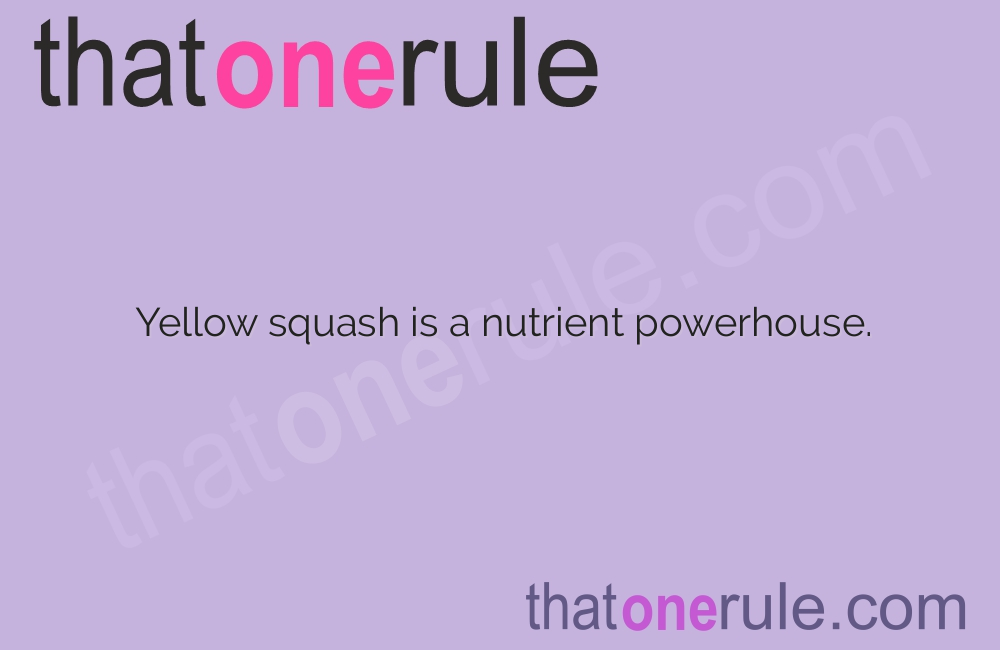Exploring the Nutritional Benefits of Yellow Squash

Yellow squash is a nutrient powerhouse.
Adding yellow squash to your diet can boost your overall health.
The vibrant yellow color of squash is a visual testament to its nutritional value.
Yellow squash is low in calories but high in essential nutrients.
Including yellow squash in your meals can aid in weight management.
Yellow squash is a great source of dietary fiber, helping to promote digestion and gut health.
Consuming yellow squash can strengthen your immune system.
Yellow squash is rich in vitamins A and C, supporting healthy skin and boosting collagen production.
The antioxidants found in yellow squash can combat inflammation and oxidative stress in the body.
Yellow squash is a good source of potassium, which is important for maintaining heart health.
Incorporating yellow squash into your diet may help lower your risk of chronic diseases.
Yellow squash provides a significant amount of vitamin B6, which plays a role in brain function and development.
Eating yellow squash can aid in maintaining healthy blood sugar levels.
Yellow squash is a natural diuretic, promoting healthy fluid balance in the body.
The manganese content in yellow squash helps support healthy bone development and strength.
Including yellow squash in your diet can help improve your vision due to its high vitamin A content.
Yellow squash can be a versatile and tasty addition to a variety of dishes.
Exploring the Nutritional Benefits of Yellow Squash part 2
The fiber in yellow squash can help keep you feeling full and satisfied after meals.
Yellow squash is a hydrating food, helping to maintain proper hydration levels.
The folate found in yellow squash is essential during pregnancy for healthy fetal development.
Yellow squash can be a delicious and nutritious alternative to high-calorie foods.
Adding yellow squash to your meals can add a pop of color and flavor.
Yellow squash is a natural source of energy, thanks to its carbohydrate content.
Consuming yellow squash regularly can help alleviate constipation and support regular bowel movements.
Yellow squash is a good source of magnesium, which is important for nerve and muscle function.
Incorporating yellow squash into your diet can help improve your overall mood and well-being.
Yellow squash is low in sodium, making it a heart-healthy food option.
Eating yellow squash can aid in the prevention of age-related macular degeneration.
Yellow squash is a versatile ingredient that can be used in both sweet and savory recipes.
The fiber content in yellow squash can contribute to a healthy gut microbiome.
Yellow squash is an excellent source of vitamin K, which plays a role in blood clotting and bone health.
Consuming yellow squash can help reduce the risk of certain types of cancers.
Yellow squash is a great option for those following a gluten-free or paleo diet.
Including yellow squash in your meals can support healthy liver function.
Yellow squash can be a fun and healthy snack option for kids.
Eating yellow squash can help regulate blood pressure levels.
Yellow squash is a low-glycemic food, making it suitable for individuals with diabetes.
Adding yellow squash to your diet can improve your overall nutrient intake.
Yellow squash is an excellent source of antioxidants, promoting cellular health and reducing the risk of chronic diseases.
Consuming yellow squash can aid in detoxification and support optimal liver function.
Yellow squash can be enjoyed raw in salads or cooked in various delicious recipes.
Including yellow squash in your diet can help reduce the risk of stroke.
Yellow squash is a nutrient-dense food, meaning it provides a high amount of nutrients compared to its calorie content.
Eating yellow squash can help improve digestion and alleviate digestive issues.
Yellow squash is a delicious way to incorporate more veggies into your diet.

